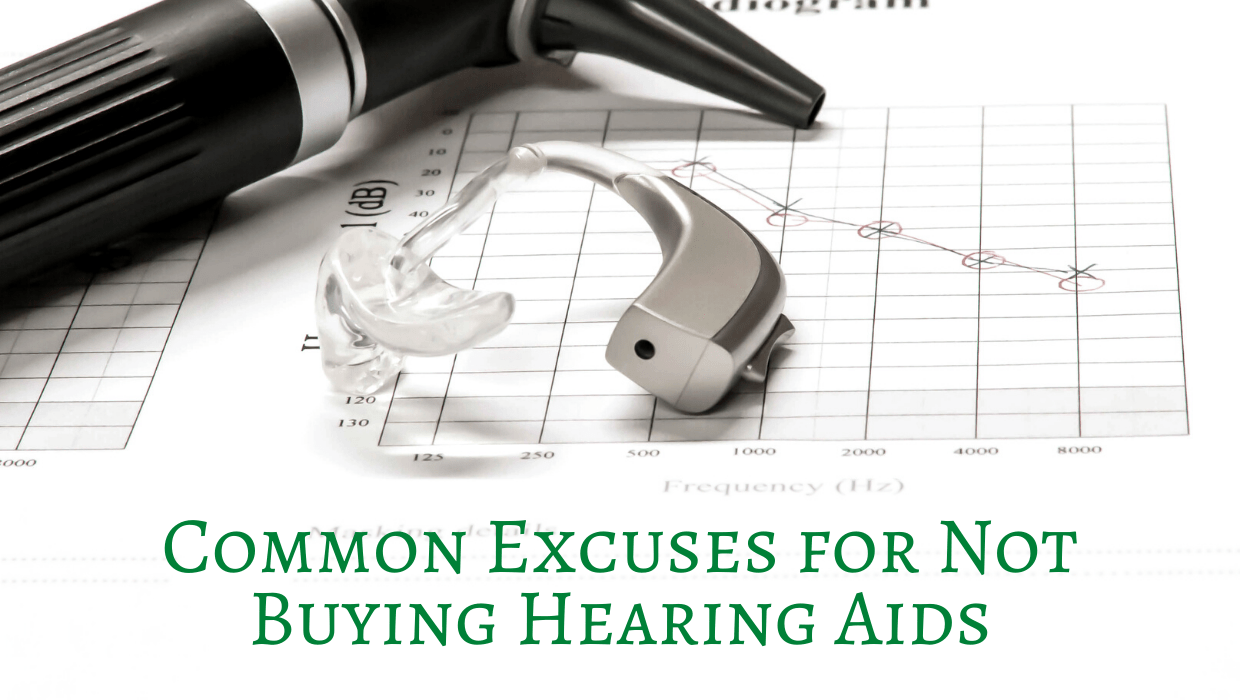- The Benefits of Being Social for Older Americans - February 29, 2020
- Common Excuses for Not Buying Hearing Aids - February 29, 2020
- How Treating Hearing Loss Improves Your Relationships - February 18, 2020
If you know someone who is struggling to hear but still hasn’t treated their hearing loss, they’re not the only one. About 40 million Americans suffer hearing loss, but many will wait five or seven years before they get hearing aids!
A hearing loss will intensify during this period, and they will risk experiencing accelerated cognitive deterioration, social alienation, loss of mobility, and be at a higher risk of developing depression, anxiety, or dementia.
Below are some of the most typical reasons people give for not buying hearing aids. Be armed with the facts should your friend or family member make one of these excuses.
“I don’t have hearing loss.”
This kind of language can be problematic because they don’t understand the issue. If they deny that there’s a problem at all, it’s going to be hard to push towards solutions.
As a partner, family member, caregiver, or friend, continuing to tolerate different behaviors associated with untreated hearing loss— repeating words or phrases excessively, speaking louder, and so on — can reinforce their belief that their hearing capacity is perfect.
Instead, try to talk openly and honestly about the advantages of having checked their hearing without criticizing or disturbing them.
“My hearing loss is not that bad yet.”
The person experiencing symptoms of hearing impairment may not be aware that they compensate by turning up the volume on their listening devices, televisions, or shying away from their usual group activities. The danger lies in the lack of action or the knowledge of their situation.
But popular reasons for failing to attend to our hearing health needs potentially hinder our ability to recover and sometimes delay our normal hearing process to the point of no return.
“If I get a hearing aid, that means that I’m officially old.”
Most people are concerned with wearing a hearing aid and feeling like they’re’ past it.’ This is especially acute in the world of work, where dynamism and vitality are seen in any position as almost necessary capacities to possess.
While it’s right that older people are the biggest users of hearing aids, the quickest path to looking older is to constantly those around you to repeat what they’ve stated. And this is a common occurrence for those with untreated loss of hearing.
“It’s too complicated to learn how to use hearing aids.”
Adapting to hearing aids can, indeed, take a while. You might have to wear them for four months get used to and get the most out of your hearing aids.
But from the outset, you’ll see subtle improvements, and it’s necessary to be patient to realize the full benefits of hearing aid.
Hearing aids are also expected to be adjusted several times during the trial period. It’s a team effort, so don’t be afraid to talk up. Once you get used to them, you’ll be shocked by how much freedom you can recover in your life.
“My last hearing aid didn’t work.”
Did you order inexpensive hearing aids or over-the-counter hearing aids? These do not come with the resources you need for an effortless hearing, and they are unlikely to be tailored to your specific hearing specifications.
These may be sold as premium hearing aids, but they are just an amplifier that makes sounds louder without letting you hear clearly. If you’ve used these and had a bad experience, then you probably don’t think hearing aids work.
But the best hearing aids minimize background noise, help you focus on the essential sounds of speech, and foster more natural hearing. We offer risk-free trials for some hearing aids. So, before you commit to buying them, you can be in the driver’s seat and choose only the devices that work for you.
“Hearing aids are too expensive.”
Hearing aids should be considered investments— and you can get a high return on them.
Your quality of life could improve greatly using these devices. Hearing loss has been shown to affect everything from work performance to safety, and if there have been several studies which point to hearing aids improving many of these areas.
Hearing aids often keep people connected; if you cannot hear what is being said, you cannot be part of the discussion. This includes everyone from the store clerk, to your old college friend you bump into on the street, to the love of your life.
Why not visit us and see what a huge improvement hearing aids could make in your life?

